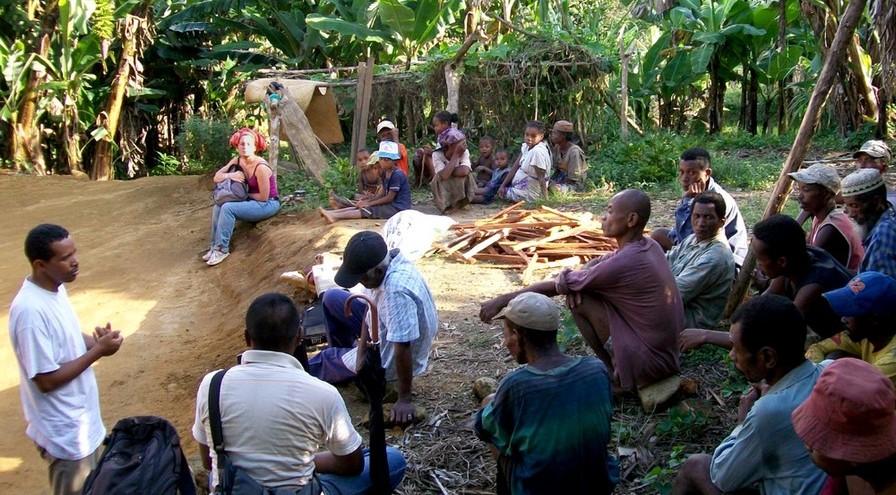Results & impact 28 October 2025
- Home
- CIRAD news
- News
- Environmental policies: payments may be counter-productive
Environmental policies and incentives: payments may prove counter-productive

Meeting between farmers and hydroelectricity project staff about establishing payments for environmental services - Madagascar © CIRAD, G. Serpantié
A year ago, Driss Ezzine de Blas, a socioeconomist with CIRAD, observed that PES were proving less effective than expected. He has since used behavioural economics and social psychology to find out why. This vast question has now been covered in a special issue of the journal Ecological Economics, entitled Crowding-out or crowding-in? Behavioural and ethical responses to economic incentives for conservation . The issue, coordinated by D. Ezzine de Blas and published in February 2019, "explores a real grey area in the field of incentive measures", he says. His interdisciplinary approach served to decipher the factors that determine whether people are motivated by incentives. The experts involved suggest certain good practices to make environmental conservation programmes more effective, which could also be of use to development programmes: deciphering the intrinsic motivations of the players in a given territory, taking account of the institutional and cultural context, and ensuring a participatory approach and social reciprocity.
The limitations of economic rationality
Introducing purely financial incentives such as agroenvironmental measures is usually prompted by the assumption that individuals act in an economically rational way. However, this is rarely the case in the real world. "If I pay for a child's bus ticket so he can go to school, will he necessarily go? Economic rationality says yes, but the truth is often different", Driss Ezzine de Blas says.
Payments may prove counter-productive
The researcher used social psychology to look at the question of pleasure, and the link with intrinsic motivations. This showed that forcing or paying someone to do something they previously liked doing reduces the pleasure they get from it. "And this is exacerbated by the undermining effect, a concept that has barely been considered in this field", the socieconomist points out. "For instance, farmers plant trees because they want to. If they are then paid to plant them, via a PES programme or some other environmental policy, they will probably not like it anything like as much. Incentives may also be seen as a loss of independence. The result is that once payments end, farmers are likely to plant fewer trees than before. This is the undermining effect, which can make incentives counter-productive in the long run (see box)."
A conceptual framework for motivation pathways
The authors built a conceptual framework representing the chain of psychological causality followed by individuals, which itself fits into a broader structure encompassing culture, institutions, etc. They stress that it is not just motivational pathways that should be taken into account, but their interactions with governance dynamics and local culture.
Conclusions and good practices
This work highlights the necessity of linking psychological processes with the factors that determine the socioecological performance of conservation incentives. The authors' understanding of what motivates individuals, and various case studies, enabled them to identify certain rules of good practice to make policies more effective:
- Study existing intrinsic motivations within a territory
The authors concluded that existing intrinsic motivations within a territory should be mapped before drafting PES programmes. In Nicaragua, for instance, a programme paid livestock farmers to switch from conventional to agro-pastoral systems. A study showed that the programme had in fact had little impact, since there was already a regional silvo-pastoral culture and farmers were aware of the merits of planting trees on their farms. - Adopt a participatory rather than a top-down approach
The conceptual framework set out in the introductory article shows that top-down conservation incentive policies reduce participants' intrinsic motivation, since they feel that the policies have been imposed on them. Conversely, bottom-up or participatory approaches should boost the individuals' intrinsic motivation, hence long-term performance, since they build a feeling of belonging and support the participants' personal development ambitions. - Conditionality and social reciprocity
One other point is seen as essential: social reciprocity. Intrinsic motivation to take part in a PES programme will be greater if the structure (authorities, NGOs or development players) managing the programme also makes a commitment. This could be developing infrastructures, such as schools or roads.
Cambodia: a PES programme that may harm forests
One of the articles in the Ecological Economics special issue concerns a case study in Cambodia. The authors estimated the impact of a Cambodian PES system aimed at conserving forests. In practical terms, an NGO offered people a contract: those who took up the offer committed to stopping illegal logging activities, in return for payment. Researchers questioned both people who signed contracts, and others who did not. The results showed that the programme modified people's perceptions of forests: rather than seeing them as a means of subsistence, they sometimes saw them as a source of income. The PES participants who emphasized money-related aspects were much more likely to say that they would break conservation rules once payments stopped. In line with their conceptual framework, this led the researchers to predict an undermining effect that means that the programme will have a negative long-term impact on the forests.



























